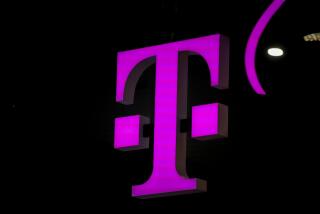FCC Raises $16.9 Billion in Airwave Auction for Licenses
- Share via
WASHINGTON — Wrapping up the most lucrative government auction in history, regulators said Friday that they have $16.9 billion by selling slices of the nation’s airwaves to giant wireless telephone companies eager to own new pieces of the dwindling spectrum.
The auction, begun by the Federal Communications Commission in December, drew more than 100 rounds of bidding from scores of wireless and cellular telephone carriers fighting over 422 licenses in 195 markets nationwide.
Three Los Angeles licenses fetched $1.4 billion, or about $450 million each, second only to New York, where some licenses sold for more than $2 billion.
“The spectrum is like real estate, and this is prime, beachfront real estate,” said Ira Brodsky, president of Datacomm Research Co., a Chesterfield, Mo.-based wireless consultant.
Though analysts questioned some of the eye-popping prices, wireless companies said they need the added spectrum to enhance their existing cellular phone networks, particularly in heavily populated markets. The spectrum should allow carriers to improve the quality of their service and reduce the number of dropped calls.
Carriers also are stockpiling spectrum in anticipation of the next generation of wireless products and services, including music beamed to car radios and cell phones that can display video.
“This is going to enable us to offer state-of-the-art services,” said George Crowley, chief executive of Maryland-based Salmon PSC, which teamed with Cingular Wireless to win one of the sought-after Los Angeles licenses.
The top bidder in Los Angeles was Verizon Wireless, the nation’s largest wireless carrier. AT&T; Wireless, with a smaller partner, Alaska Native Wireless, picked up the third Los Angeles license.
Nationwide, Verizon paid $8.8 billion for 113 licenses in Los Angeles, New York, Chicago, Boston, Washington, San Francisco and other cities. Verizon officials declined to comment Friday, saying auction rules prohibited them from communicating with other bidders for two more weeks.
Cingular, a joint venture of BellSouth and SBC Communications, paid $2.3 billion for 79 licenses nationwide. AT&T; and its partner scooped up 44 licenses for a total of about $2.9 billion.
But it may be a while before consumers notice any improvements in their cell phone service, analysts warned, because of a variety of legal challenges.
“There are still some legal challenges that might delay the timing for rolling out these services,” said Becky Diercks, director of wireless research at Cahners In-Stat Group, a Boston consulting group.
Many of the licenses auctioned Friday were originally sold to NextWave Telecom Inc., a wireless company undergoing bankruptcy reorganization. The FCC repossessed the spectrum after NextWave defaulted on its license payments.
The New York company, which has failed to win back the licenses so far, returns to court for another try in March.
Also, some losing bidders are already crying foul about the auction process, complaining that AT&T;, Cingular and other large wireless companies took advantage of FCC rules designed to ensure that smaller entrepreneurs were able to compete for some of the licenses.
For example, Cingular owns 85% of Salmon and AT&T; has a 39% stake in Alaska Native. By teaming with these smaller players, AT&T; and Cingular qualified for 25% credits on their bids--for example, making $100-million bids count as $125 million.
“These were shams set up by big companies to win the licenses,” said John Rogovin, attorney for Allegheny Communications, a losing bidder for one of the licenses in San Antonio. Allegheny raised some of the same concerns last month when it lost a court bid to halt the FCC auction.
Winning bidders said they made no attempt to hide their relationships, which they insist conform to FCC rules designed to encourage partnerships between entrepreneurs and large carriers.
“These rules have been in place for a while,” said Mark Bradner, vice president of acquisitions at AT&T.; “We think we’ve done exactly the kind of thing that the FCC and Congress were trying to promote.”
FCC officials declined to comment.
Conrad Bagne, managing director of Alaska Native, said small wireless entrepreneurs had no hope of winning licenses unless they could team with deep-pocketed partners.
“This is expensive,” Bagne said. “No individual entrepreneur can get the kind of money you need.”
Bagne said it was too soon to comment on how AT&T; and Alaska would use the new licenses.
Proceeds from the auction go to the U.S. Treasury. The previous record for a wireless auction was set in 1996, when bidders paid $10.2 billion.






